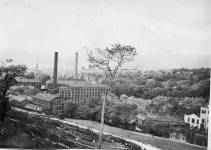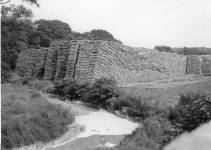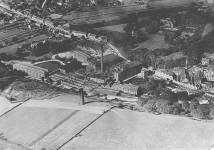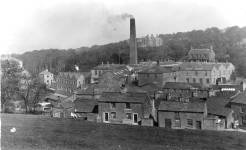Olive & Partington's Turnlee Mills.

The paper making concern of Olive & Partington and its successors was one of the largest in the world. This page provides a brief overview of the company.
These links provide more detail: Interior Photographs The Tiger Tractors The Boiling Pan disaster.
Towards the end of the 19th century, the importance of Olive & Partington's was acknowledged by articles in the trade press. Two examples are Popular Papers and their Manufacture and The “King of the Paper Trade”.
William Olive and Edward Partington (later Lord Doverdale) became tenants of Turn Lee Mills in 1873. Everything was overhauled, defects made good, improvements made, and the ability of the workpeople weighed up. The town became used to seeing lorry loads of esparto grass, old rags and ropes, old paper, etc., being taken from the station to Turn Lee to be made into paper. Experiments in making paper from wood pulp eventually succeeded and brought a sight which was to become even more familiar, piles of logs at the railway station and loads being taken up Victoria Street on trailers pulled by Tiger Tractors.
Before too long the Turn Lee and Dover mills proved to be too small. Extension was achieved both by the leasing of extra land in 1876 and 1882 and the Tip Mill was bought to secure the water rights. In 1885 the manufacture of art papers started in a special factory adjacent to the mills and in 1897 a further art paper mill was built, the erection of new mills changing the whole aspect of Charlestown.
It wasn't only in Glossop that the company was based. The Ramsbottom Paper Mill Co., Broughton Bridge Mills and Barrow-in-Furness Mills were acquired. Collaboration with the Austrian chemist Karl Kellner led to the establishment of the Kellner-Partington Paper Pulp Co Ltd, which succeeded the Barrow Chemical Wood Pulp Company, in 1889 and the acquisition of mills at Borregaard in Norway, Hallein in Austria and Forshaga in Sweden.
The firm was floated as Olive and Partington Limited on 20th February, 1901. Various changes of company name, generally based on variations of Barrow Paper Mills and Kellner-Partington, followed before control passed to the Inveresk Paper Co. Ltd, in 1926, and the company became a member of the Inveresk group of paper-making concerns.
Talking of floating, the mills were subject to flooding when the Gnat Hole Brook burst its banks. On several occasions, logs were carried downstream for several miles. Despite that, the business continued to thrive for many years.
The Glossop Official Handbook of 1948 described Olive & Partington as one of the town's most important industrial concerns, with a world-wide reputation. The Guide of around a decade later noted that the industry continued to expand, being "almost unique in manufacturing its own pulp from imported timber". A modernisation programme was undertaken and completed in November 1962 but on 29th November 1963 the works closed down with a loss of 600 jobs.




Return to GJH.me Home Page, Return to Glossop Area Local Histories index.
Last updated: 8 November 2021





